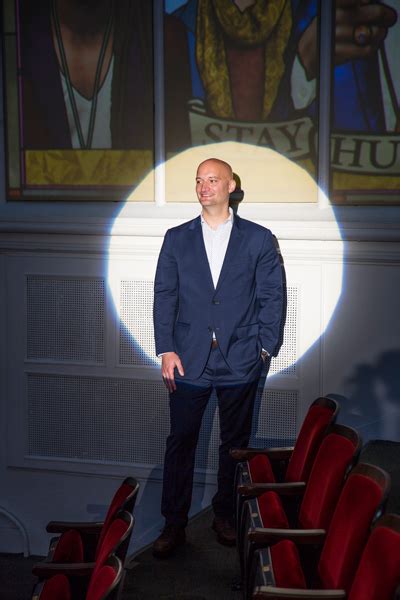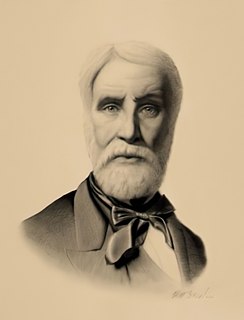A Quote by Paul Sears
It is the great destiny of human science, not to ease man's labors or prolong his life, noble as those ends may be nor to serve the ends of power, but to enable man to walk upright without fear in a world which he at length will understand and which is his home.
Related Quotes
Why are we proud? We are proud, first of all, because from the beginning of this Nation, a man can walk upright, no matter who he is, or who she is. He can walk upright and meet his friend - or his enemy; and he does not fear that because that enemy may be in a position of great power that he can be suddenly thrown in jail to rot there without charges and with no recourse to justice. We have the habeas corpus act, and we respect it.
What is the importance of human lives? Is it their continuing alive for so many years like animals in a menagerie? The value of a man cannot be judged by the number of diseases from which he escapes. The value of a man is in his human qualities: in his character, in his conscience, in the nobility and magnanimity, of his soul. Torturing animals to prolong human life has separated science from the most important thing that life has produced - the human conscience.
In order to institute action, it is not sufficient that the individual man have unachieved ends that he would like to fulfill. He must also expect that certain modes of behavior will enable him to attain his ends. A man may have a desire for sunshine, but if he realizes that he can do nothing to achieve it, he does not act on this desire.
The idea of beauty which man creates for himself imprints itself on his whole attire, crumples or stiffens his dress, rounds off or squares his gesture, and in the long run even ends by subtly penetrating the very features of his face. Man ends by looking like his ideal self. These engravings can be translated either into beauty or ugliness; in one direction, they become caricatures, in the other, antique statues.
The world is a better place to live in because it contains human beings who will give up ease and security in order to do what they themselves think worth doing. They do the useless, brave, noble, divinely foolish, and the very wisest things that are done by Man. And what they prove to themselves and to others is that Man is no mere creature of his habits, no automaton in his routine, but that in the dust of which he is made there is also fire, lighted now and then by great winds from the sky.
Man has risen, not fallen. He can choose to develop his capacities as the highest animal and to try to rise still farther, or he can choose otherwise. The choice is his responsibility, and his alone. There is no automatism that will carry him upward without choice or effort and there is no trend solely in the right direction. Evolution has no purpose; man must supply this for himself. The means to gaining right ends involve both organic evolution and human evolution, but human choice as to what are the right ends must be based on human evolution.
Economics is a theoretical science and as such abstains from any judgement of value. It is not its task to tell people what ends they should aim at. It is a science of the means to be applied for attainment of ends chosen, not, to be sure, a science of the choosing of ends. Ultimate decisions, the valuations and the choosing of ends, are beyond the scope of any science. Science never tells a man how he should act; it merely shows how a man must act if he wants to attain definite ends.
Men are naturally lazy, and require some great stimulus to goad their flagging ambitions and enable them to overcome the inertia which comes from ease and the consciousness of inherited wealth. Whatever lessens in a young man the feeling that he must make his way in the world cripples his chance of success. Poverty has ever been the priceless spur that has goaded man up to his own loaf.
The things of the world are ever rising and falling, and in perpetual change; and this change must be according to the will of God, as He has bestowed upon man neither the wisdom nor the power to enable him to check it. The great lesson in these things is, that man must strengthen himself doubly at such times to fulfill his duty and to do what is right, and must seek his happiness and inward peace from objects which cannot be taken away from him.
Tragedy dramatizes human life as potentiality and fulfillment. Its virtual future, or Destiny, is therefore quite different from that created in comedy. Comic Destiny is Fortune - what the world will bring, and the man will take or miss, encounter or escape; tragic Destiny is what the man brings, and the world will demand of him. That is his Fate.
To repress rebellion is to maintain the status quo, a condition which binds the mortal creature in a state of intellectual or physical slavery. But it is impossible to chain man merely by slaving his body; the mind also must be held, and to accomplish this, fear is the accepted weapon. The common man must fear life, fear death, fear God, fear the Devil, and fear most the overlords, the keepers of his destiny.
How very seldom do you encounter in the world a man of great abilities, acquirements, experience, who will unmask his mind, unbutton his brains, and pour forth in careless and picturesque phrase all the results of his studies and observation; his knowledge of men, books, and nature. On the contrary, if a man has by any chance an original idea, he hoards it as if it were old gold; and rather avoids the subject with which he is most conversant, from fear that you may appropriate his best thoughts.






































